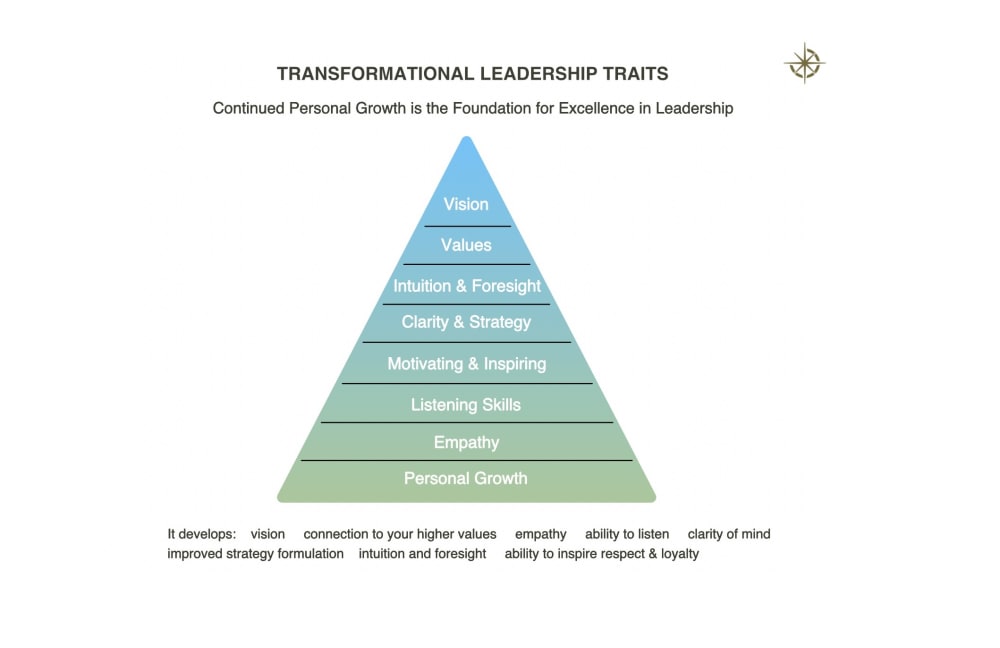This informal CPD article Transformational Leadership & Personal Development was provided by Lubna Samara at HigherWill, a Spiritual Coaching and Leadership Training provider.
What does Spirituality have to do with Leadership?
I was asked recently what does Spirituality have to do with Leadership? To my mind I don’t see how it’s possible to separate good Leadership from our connectedness to our higher values, to our inner selves and to each other. And each one of us leads - whether it’s our team and customers at work, our team at home, our friends, or people we influence.
Transformational leaders create and empower synergistic relationships between the leadership and the work force. It’s a mind-set that nourishes the whole of the company, clients and community.
Any venture or enterprise classically starts out with
Mission: typically an ideal, a labour of love, a dream by a visionary or entrepreneur. Mission is the Why. It’s a passion that comes from the heart. In any enterprise, community or group, the Leader holds the Why.
Vision: the What you’ll be doing to bring the mission to birth and give it definition and form. This usually would involve bringing in more people who share the vision, and crucially, the values associated with the mission.
Goals: the How. At this stage there would be operations systems to meet goals and targets, and teams put in place to for the execution of the plan.
Transformational leaders set values
Transformational leaders set values alongside mission, vision, and goals. A confident leader can pull off vision with poor values but only for so long. We’ve seen this repeatedly where a charismatic leader’s vision is intrinsically selfish and sooner or later the leader loses the respect of their followers, clients or electoral base. Setting values clearly and holding by them operationally is the backbone for the corporate culture. Vision can be fine-tuned to steer the company through changing or challenging times, but the values remain for the main part steady.
Transformational leaders guide and inspire
Transformational leaders guide and inspire; they serve their team, their clients, and their community. Well-supported people are far more likely to achieve their potential and produce their best work. A customer base that feels listened to and appreciated is far more likely to be loyal. As a client, I’ve personally left companies I’d been loyal to for years because of their policy to reward new clients at the expense of the long-standing customers.
The concept of service in leadership is not new. In the I Ching (1), a book believed to be over 5000 years old, it says “To Lead Truly Is To Serve”. Winston Churchill in his address to Congress in 1941 said “I owe my advancement entirely to the House of Commons, whose servant I am. In my country as in yours public men are proud to be the servants of the State and would be ashamed to be its masters“. (2)
The three most important traits of a leader
According to Larry Spears who served as president of the Robert Greenleaf Centre for Servant-Leadership from 1990 to 2007, the three most important traits of a leader are 1) to be a good listener, 2) to have empathy, and 3) to be a healer (3). Many of the companies named in Fortune Magazine’s annual listing of “The 100 Best Companies to Work For” adopt a servant leadership approach and have integrated it into their corporate cultures.
The benefits of meditation to business leaders has been much written about, including by Forbes magazine (4). Personal development goes beyond meditation to heal self-defeating behaviour patterns and negative emotional loops, and the more of these we clear the better we’re able to reflect our inner self. The chart below shows how the main traits of transformational leadership can be enhanced by attention to personal development. Connectedness to values, strengthening vision and goals, gaining clarity of mind, improving empathy, listening skills, intuition, foresight, and to inspire and motivate.













